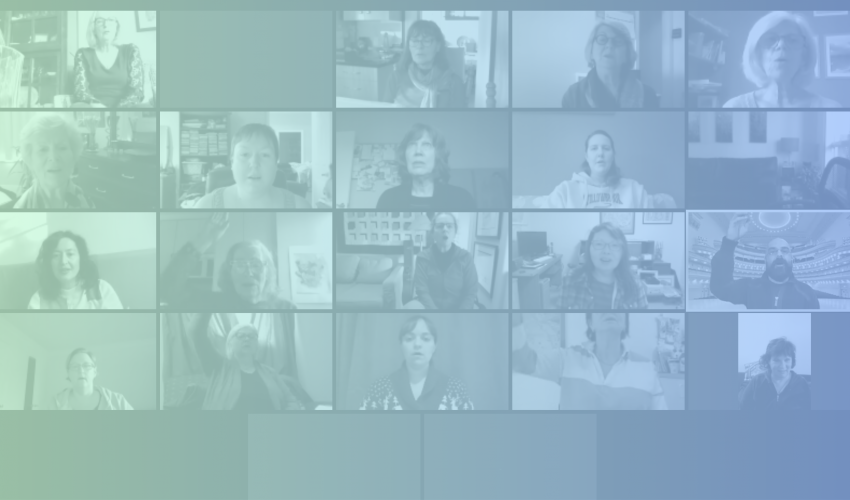A Virtual Singing Collective Unites: Updates from SingWell’s UBC Research Partners

Guest post by the SingWell-funded research team at the University of British Columbia
During the Covid-19 pandemic era, many community arts activities around the world were suddenly delimited or completely halted, including a multitude of beloved singing collectives that were greatly missed. Into that breach, the amazing growth of virtual group platforms provided means to connect socially and creatively across the planet, and generated thrilling new forms of artistic collaboration.
In transitioning to virtual platforms, high-latency audio formats lag posed challenges for synchronous music-making. The dynamic emergent expansion of low-latency virtual audio technologies enabled singing collectives to hear each other synchronously in real-time, providing access venues for deep musical communion in the virtual meeting space.
As distancing restrictions eased, music groups quickly resumed in-person gatherings. However, an exciting outcome of the virtual experience has concurrently become clear: a game-changing realization that for people with mobility, immune, or other access challenges, the virtual realm now offers ongoing resources for synchronous music-making gatherings, and the intrinsic health and well-being benefits of collective singing.
Building from SingWell’s pilot study by Dr. Arla Good and Dr. Alex Pachete at Toronto Metropolitan University, our SingWell-funded research team at the University of British Columbia comprises faculty and students from the BC Brain Wellness Program (BCBWP) at the Djavad Mowafaghian Centre for Brain Health, the School of Music, and the Department of Music Education. Our study, entitled “Virtually Together: Do you hear what I hear? A singing collective unites”, was drawn from the BCBWP “Musical Movements” class created and facilitated by singer-pianist and choral director Cynthia Friesen. Combining group singing, breath/movement exercise, music skill-building, and thematic social dialogue, the multi-strand participant continuum included people with neurological challenges, care partners of any age, and community members familiar with BCBWP’s broad range of activities for 55+ “healthy agers.”
Methods
Within a 12-week model, we investigated questions about the virtual class within two group singing technical frameworks: high-latency non-synchronous audio (singers muted from each other, only music facilitator heard by all participants) and low-latency synchronous audio (participants and facilitator all unmuted, singing together and hearing each other synchronously). During the first 6 weekly one-hour sessions the musical activities were held in muted non-synchronous music audio format, transitioning in Week 8 to unmuted synchronous music audio format. Dialogues were unmuted in both formats, since those did not require sound synchrony.
Findings
Aside from some technology learning curves, our mixed-method data capture suggests that both formats contributed to improved mood and feelings of social connectedness, trending toward a stronger effect in the synchronous audio format. An sense of evolving community over the duration of the course was cited by multiple participants. As one commented:
“We’re doing something all together at the same time, so there’s this sense of shared experience… and there’s a kind of reassurance that we can all be supporting each other.”
Singers reported decreased pain during all 12 sessions, and decreased levels of the stress hormone cortisol were also observed. As such, our results support evidence of beneficial mechanisms during both virtual audio formats. Notably, while mood/connection elements were elevated in the synchronous audio format when participants heard each other singing, decreased cortisol and pain levels appeared less dependent on hearing others – causing speculation that those results are driven by the physiological aspects of singing, such as deep breathing.
Participants also cited music’s visceral power to express and release emotions. As one participant put it:
“I remember coming out of the room and saying to my husband, ‘I feel great. And it’s because of the music and the singing and being able to belt it out and, I guess, getting all of that oxygen in’.”
Inspiring participant wishes for ongoing virtual singing opportunities have generated Ms. Friesen’s new BCBWP class in Fall 2024, entitled “Virtually Together in Song”.
Research team
Primary Co-I Facilitation Team: Cynthia Friesen, BCBWP Course Facilitator; Dr. Tara Gaertner, Faculty of Medicine, Psychiatry; • Prof. Peter Gouzouasis, Dept of Curriculum and Pedagogy, Faculty of Education; Prof. Silke Cresswell, Director of BCBWP, Faculty of Medicine, Neurology
Advisors: Prof. Emeritus Debra Sheet, UVic Faculty of Nursing; Dr. Julia Ulehla, School of Music, Ethnomusicology and Interdisciplinary Studies
Undergraduate Research Assistants: Gael Hernadez-Palmer, Neuroscience; Manat Siddhu, Psychology.
Principle Investigator: Prof. Rena Sharon, School of Music, Collaborative Piano